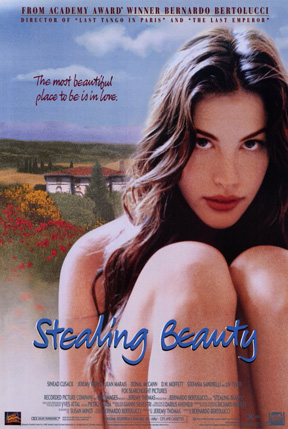Some of that’s because I happen to be a fourth Italian. And a lot of it is because many of my favorite filmmakers are Italian. However, Italy is also place of which I have a lot of wonderful memories. I spent the summer after my high school graduation in Italy and it was amazing.
Venice was full of sensual mystery (and, to be honest, some pretty obnoxious tourists as well). Naples was dangerous and exciting. Pompeii made me feel like I was living history. Rome was full of handsome men and temptation. When I walked through the Vatican, my inner Catholic girl suddenly woke up and I just had to stop and stare. And Tuscany — oh my God, Tuscany! That summer, as far as I was concerned, Tuscany was the most beautiful and romantic place on Earth. I can still remember standing in the street of Florence and seeing the dome of the Cattedrale di Santa Maria del Fiore in the distance and, for a minute, I almost felt like I was in a painting. And I actually started to get light-headed and dizzy, I was so overwhelmed by it all.
(That’s right. Stendhal Syndrome isn’t just a Dario Argento film.)
At it’s best, the 1996 film Stealing Beauty made me think about that wonderful summer that I spent in Italy. And, at its worse, Stealing Beauty made me happy that I made that trip with my sisters and not Lucy Harmon.
Lucy Harmon is the main character in Stealing Beauty. Played by a young Liv Tyler, Lucy is the teenage daughter of a poet who has recently committed suicide. Lucy is a poet herself. Among her poems: “The dye is cast/ The dice are rolled/ I feel like shit/ you look like gold” and “I wait/ I wait so patiently/ I’m as quiet as a cup/ I hope you’ll come and rattle me/ Quick!/ Come wake me up.” That’s right — Lucy writes the same type of crap that I used to write when I was 17 and trying to impress everyone with the depth of my mind. The only difference is that Lucy is rich and privileged so her poetry doesn’t actually have to be any good.
Anyway, Lucy comes to Tuscany for three reasons. First off, she wants to be sculpted by one of her mother’s friends, who lives in a villa. Secondly, she wants to lose her virginity to an Italian boy who, years before, kissed her. And, finally, she wants to learn the identity of her father, who she believes to be one of the residents of the villa.
The film’s great when it concentrates on the beauty of Tuscany. It’s a beautiful film to look at and, as its best, it captures the romance of being young and having your entire life ahead of you. In that way, the film brought back a lot of good memories and it made me want to revisit Italy.
But then, whenever I was fully content to just enjoy the sight of Tuscany, the film had to try to focus on Lucy and the other people living in the villa and … bleh. For all of their talk about art and political posturing, they all basically came across as being a bunch of self-righteous fakes, the equivalent of the millionaire with a Che poster in his office. In the end, there are only two adults that you end up liking. You like writer Alex Parris (Jeremy Irons) because he’s dying and, as a result, doesn’t feel the need to try to impress anyone. And, despite the film’s intentions, you end up liking the local fascist, Carlo Lisca (Carlo Checchi), because he doesn’t apologize for or try to rationalize his narcissism. You like Carlo because all of the other characters dislike him.
In the role of Lucy, Liv Tyler is obviously beautiful and gives as good a performance as the script will allow. At the same time, as a character, Lucy got on my last nerve. Judging from what we see of her work, Lucy is not a particularly talented poet. In fact, Lucy appears to often be an amazingly vapid person. (Her much-commented on virginity only serves to confirm that Lucy is largely meant to be a male fantasy.) But, at the same time, she’s rich and she’s got a famous mother and, as a result, the film seems to be telling us that it’s not important that she’s not really that interesting.
So, plotwise, Stealing Beauty did not really work for me. But the scenery was truly beautiful.

Pingback: Back to School Part II #31: Empire Records (dir by Allan Moyle) | Through the Shattered Lens